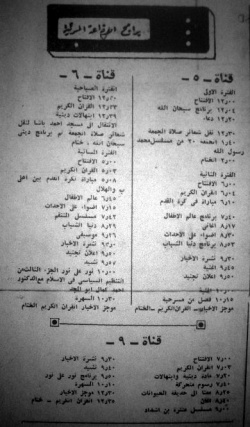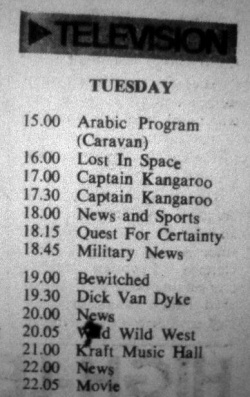Libya
LIBYA is in North Africa, to the west of Algeria, at the mouth of the Mediterranean Sea.
Profile
| Country Number (32) | 1969? | FIRST WAVE |
| Region | Africa | |
| Television commenced | 1958 / 24 December 1968 | |
| Colour System | 1976 | PAL |
| Population | 1970 | 1.8 million |
| TV Sets | 1970 | 1,000 |
| Language/s | English, Arabic and French | Dubbed and Subtitled |
Television Stations / Channels
Libya did not establish its own television service until the end of 1968. However, television entertainment was available to those wealthy enough to own a television set as they could receive limited transmissions from Italy and Tunisia, and also broadcasts in English from the Wheelus Airforce Base in Tripoli.
The American Wheelus Base (WAB) operated its own NTSC station in 1958, which was one of the first television stations established within the greater the Arab world.
The Libyan Broadcasting & TV Service, a government-owned commercial broadcaster, began transmitting on 24 December 1968.
All television broadcasts were disrupted following the 1 September 1969 Libyan revolution lead by Muammar al-Gaddafi.
Wheelus Base was vacated in June 1970. Regular television broadcasts were re-established on the local channels by 1971. Colour transmissions began in 1976 using the PAL colour broadcast system.
Language/s
The principal languages of Libya are Arabic and French. Local television was broadcast in both languages. The Wheelus Base station broadcast in English.
DOCTOR WHO IN LIBYA
الدكتور هو
Libya was (we believe) the 32nd country to screen Doctor Who; it was the 11th in Africa, and the fifth to broadcast the Arabic language versions (see Selling Doctor Who).
BBC Records
Libya is named in The Making of Doctor Who (1972 edition) as one of 27 countries to screen the series.
Libya is not recorded in the The Seventies, nor is it named in any of the DWM story Archives.
Other BBC documentation indicates that the series was sold to Libya by late 1969.
Stories bought and broadcast
WILLIAM HARTNELL
It is likely that Libya got the standard Arabic package of nine stories, 37 episodes:
| A | An Unearthly Child | 1 |
| B | The Daleks | 7 |
| C | Inside the Spaceship | 2 |
| E | The Keys of Marinus | 6 |
| F | The Aztecs | 4 |
| G | The Sensorites | 6 |
| J | Planet of Giants | 3 |
| K | The Dalek Invasion of Earth | 6 |
| L | The Rescue | 2 |
Libya would have acquired the standard Arabic-dubbed package of GROUP A, B and C of the William Hartnell stories; like other Arabic countries, only part one of An Unearthly Child probably aired.
The programme was supplied as 16mm black and white film prints with Arabic soundtracks.
Origin of the Prints?
Morocco was the previous Arabic-speaking country in Africa to screen the series so it's possible that Libya was supplied with the same set of prints. Alternatively, the prints were supplied from a Middle Eastern country – Saudi Arabia or Jordan, or from television distributors in Lebanon, where most Arabic dubs were recorded.
Transmission
TV listings
We have been unable to locate TV listings for Doctor Who. We feel sure that the series was aired on the local Libyan station rather than Wheelus.
With a date of sale in late 1969, it is almost certain that broadcasts of the series were affected by the September 1969 revolution – unless all 37 episodes had aired earlier in the year.
We viewed random issues of the Arabic paper Al-Thawrah, those available from November 1969 to the end of 1971, but TV listings were infrequent, and the few that were published did not appear to include Doctor Who.
We also accessed the English language paper The Libyan Times from July 1968 to December 1971, but the irregular TV listings that were published were those for the Wheelus Base station only. And following the September 1969 revolution and vacation of the base in June 1970, those TV listings discontinued.
Fate of the Prints?
The next Arabic and African country to air Doctor Who was Algeria, in 1973/74. It is therefore possible that Libya sent its prints of the Arabic dubbed Hartnell stories to Algeria (which was the last ever country to purchase that package of episodes). However, it's far more likely that any film prints that may have been held by the Libyan Broadcasting & TV Service were "lost" following the 1969 revolution...

